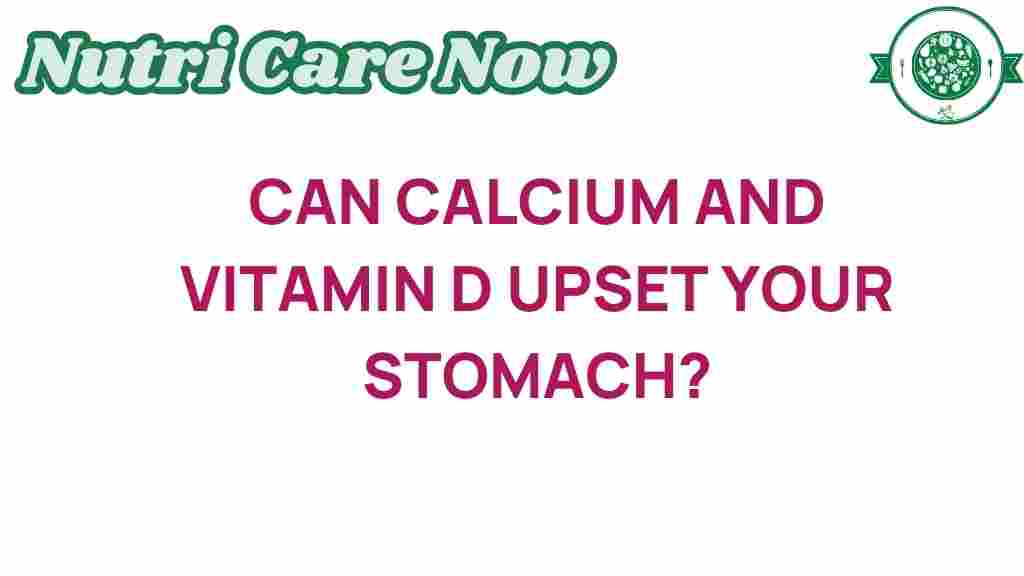Unraveling the Mystery: Can Calcium and Vitamin D Upset Your Stomach?
Calcium and vitamin D are essential nutrients that play a significant role in maintaining our overall health. They are vital for bone health, immune function, and various metabolic processes. However, many individuals who take dietary supplements containing calcium and vitamin D report experiencing stomach upset. This article delves into whether these nutrients can indeed cause digestive issues, how they impact gut health, and what you can do to maintain a nutritional balance without discomfort.
Understanding Calcium and Vitamin D
Before we explore the potential for stomach upset, it’s essential to understand what calcium and vitamin D are and their respective roles in the body.
What is Calcium?
Calcium is a mineral found in various foods and is critical for many bodily functions, including:
- Building and maintaining strong bones and teeth
- Muscle contraction
- Blood clotting
- Nerve transmission
Our bodies cannot produce calcium, so we must obtain it through our diet or supplements. Foods rich in calcium include:
- Dairy products (milk, cheese, yogurt)
- Leafy green vegetables (kale, broccoli)
- Fortified foods (orange juice, cereals)
- Fish with edible bones (sardines, salmon)
What is Vitamin D?
Vitamin D is a fat-soluble vitamin that is crucial for:
- Enhancing calcium absorption in the gut
- Maintaining proper immune function
- Regulating mood and warding off depression
Your body can produce vitamin D when your skin is exposed to sunlight. However, it can also be found in foods such as:
- Fatty fish (salmon, mackerel)
- Egg yolks
- Fortified dairy products
- Mushrooms exposed to UV light
Can Calcium and Vitamin D Upset Your Stomach?
While calcium and vitamin D are essential for health, they can sometimes lead to digestive issues, particularly when taken in supplement form. Some common complaints include:
- Stomach cramps
- Nausea
- Constipation
- Diarrhea
These symptoms can be attributed to several factors:
1. Dosage and Form of Supplements
The amount of calcium and vitamin D consumed can significantly influence digestive health. High doses of calcium supplements, especially those containing calcium carbonate, are more likely to cause stomach upset because they require stomach acid for absorption. This can lead to:
- Increased gas and bloating
- Acid rebound, leading to heartburn
2. Timing of Consumption
Taking calcium and vitamin D supplements on an empty stomach may exacerbate digestive discomfort. It’s often recommended to take these supplements with meals to improve absorption and reduce the risk of stomach upset.
3. Individual Sensitivities
Some individuals may have a sensitivity to calcium or vitamin D, or they may react poorly to certain forms of these nutrients. For example, those with lactose intolerance might experience digestive issues when consuming dairy-based calcium supplements.
4. Interactions with Other Medications
Calcium and vitamin D can interact with various medications, which may also contribute to stomach upset. Always consult with a healthcare provider about potential interactions.
Steps to Minimize Stomach Upset from Calcium and Vitamin D
If you’re experiencing stomach upset after taking calcium and vitamin D supplements, here are some steps you can take to mitigate the issue:
1. Opt for the Right Form of Supplement
Choose supplements that are less likely to upset your stomach. For calcium, consider:
- Calcium citrate: Easier on the stomach and can be taken without food.
- Calcium malate: Another gentler option that is well absorbed.
2. Adjust the Dosage
Reduce your intake to see if symptoms improve. The body can absorb calcium more effectively in smaller doses throughout the day rather than a large single dose.
3. Take with Food
Always take your supplements with meals. This can help buffer your stomach and improve absorption.
4. Stay Hydrated
Drinking plenty of water can aid digestion and help prevent constipation, which is a common side effect of calcium supplementation.
5. Monitor for Other Dietary Factors
Sometimes, other dietary factors may contribute to digestive issues. Keeping a food diary can help identify any problematic foods.
Troubleshooting Tips for Digestive Discomfort
If you continue to experience stomach upset from calcium and vitamin D, consider these troubleshooting tips:
1. Consult with a Healthcare Provider
If digestive issues persist, consult with a healthcare provider. They may recommend blood tests to check your calcium and vitamin D levels and suggest alternative supplementation methods.
2. Consider Dietary Sources
Focus on obtaining calcium and vitamin D from food sources rather than supplements. This can help maintain nutritional balance and support digestive health without the risk of upset.
3. Evaluate Your Overall Diet
A well-balanced diet rich in fiber, fruits, and vegetables can support gut health. Consider incorporating:
- Whole grains
- Legumes
- Nuts and seeds
4. Monitor Your Gut Health
Pay attention to your digestive health. If you notice persistent symptoms, seek advice from a gastroenterologist.
Conclusion
Calcium and vitamin D are crucial for maintaining overall health, yet they can cause stomach upset for some individuals when taken as dietary supplements. Understanding the factors that contribute to digestive discomfort can empower you to make informed choices about your supplementation and diet.
By opting for the right forms of these nutrients, adjusting dosages, and taking them with food, you can minimize the risk of stomach upset while still benefiting from their health effects. Always consult a healthcare provider if you have concerns or experience ongoing digestive issues.
For more information on maintaining gut health and nutritional balance, visit Nutritional Balance Insights.
If you’re looking for reputable dietary supplements, check out this resource: Healthline Supplements Guide.
This article is in the category Supplements and created by NutriCareNow Team
